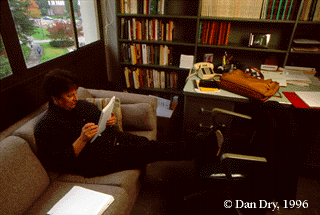 The University of Chicago Magazine February 1996
The University of Chicago Magazine February 1996 In her Berkeley office, Ortner searches interview transcripts fora clearer picture of American societyin troubled times.
In her Berkeley office, Ortner searches interview transcripts fora clearer picture of American societyin troubled times.CONTINUED
"My current line on this Jewish question is that the Jews are the American middle class, only more so. I mean, it's pretty clear that they push their kids maybe a little harder into certain kinds of professions or occupations, so you get an outcome that looks culturally distinctive--but there's nothing especially Jewish about the values they espouse."
When she compiles her results, Ortner envisions a final text that will resemble Studs Terkel's Working, or the documentary films of Frederick Wiseman and Michael Apted, in which the "raw ethnography"--people's stories in their own words--is presented nearly whole, under thematic groupings such as "divorce" and "money." The analytical sections would be separate, interspersed throughout.
These stories, she says, are "the talk of the haves--of the successful, the privileged, and the authoritative," she says. "This is 23 lawyers and 21 doctors and a judge and professors--this is the professional middle class. And when they talk, we just have to listen for a while and figure out what they're saying before we can start pigeonholing them."
The U. C. Berkeley campus in October was idyllic--lush green under a cloudless blue sky, and attractive, healthy-looking students wheeling their bicycles along pathways. The faculty here constitutes a haven of sorts--a group in which the word "Marxist" doesn't raise eyebrows or hackles.
Ortner moved to Berkeley in 1994 after 17 years at the University of Michigan, and she still marvels at the good weather and the coffee bars. But even here, the political changes that have swept the country during the past two years are making themselves felt.
"It's not like the ideologues are coming in here armed with books and trying to change things," she says. "But one place the wedge comes in is through the students. There's clearly a sector of the student body that's quite resistant to the rhetoric and perspectives of the more radicalized intellectuals, even though it's really a fairly moderate, measured, and thoughtful kind of radicalism. But it's not a process that you feel much directly, because those students don't take your courses, the ones who really hate that stuff. They're going to self-select into, you know, business or whatever."
Ortner looks upon these students, and the more right-wing views they support, as products of a lower middle class that is increasingly left out of the American dream--a view that she elaborates in an essay, "Generation X: Ethnography, Theory, and Public Culture," that is one of her first write-ups of the Newark material.
In interviews with adult children of her classmates, Ortner found that most did not fit the Generation X stereotype of whiners and slackers with no job prospects and no stake in society. The reason: Their parents have the money to help their kids pursue careers that will maintain their economic and social standing. The kids, in turn, are culturally programmed to want that standing. Ortner writes of one of the worried "twenty-somethings" she interviewed:
"David's privilege thus produces in him not a sense of `spoiled' entitlement, in which he expects everything to be handed to him on a silver platter," but instead "an anxiety that drives him to harder work and commitment."
A jaded, alienated "Generation X" is real, Ortner believes, but it's a lower-class phenomenon. And its anger--a rage that she and other observers believe is responsible for such behavior as teen suicides, the gang rapes by the all-white Spur Posse in suburban California, and racism all over--is growing.
"They're very sort of strapped and feeling very betrayed," says Ortner. "Things are worse for them now, but I think that all along that's been a sector that was vulnerable to political right-wingism and mobilization of resentment. It's the same group that Spiro Agnew was going after when he called for the Silent Majority to make themselves felt politically.
"And you can understand their anger, because they've been promised a kind of middle-class position and lifestyle, and yet they've never been given quite enough means or enough security to stay there, ex- cept at certain moments when it looked very permanent. But then it would evaporate."
The economic policies of the current Congress--policies that began with the Reagan and Bush administrations, but which Ortner believes are now being taken to extremes--will only feed this resentment, she predicts.
"It's very discouraging," she says. "Things are bad, really bad. And I have no sense of where the points of leverage are against it. That's what's so scary about the present moment: that you can't even see where to try to put the wedge. But presumably someone's going to figure it out, some good politico--which I'm not. I'm happy to lend my body and soul to the movement, but I'm not very imaginative about that."
On the other hand, maybe Ortner is "figuring it out," in her way. With her Newark project, she is responding as she always has when challenged by a new culture--by going off to study it. The U.S. is a whole new field, with a much broader body of literature than what's been written on the Sherpas.
At the start of her fourth decade as an anthropologist, "I feel like I'm a graduate student again," Ortner says. "It's very humbling."
Return to opening of "The long way home"